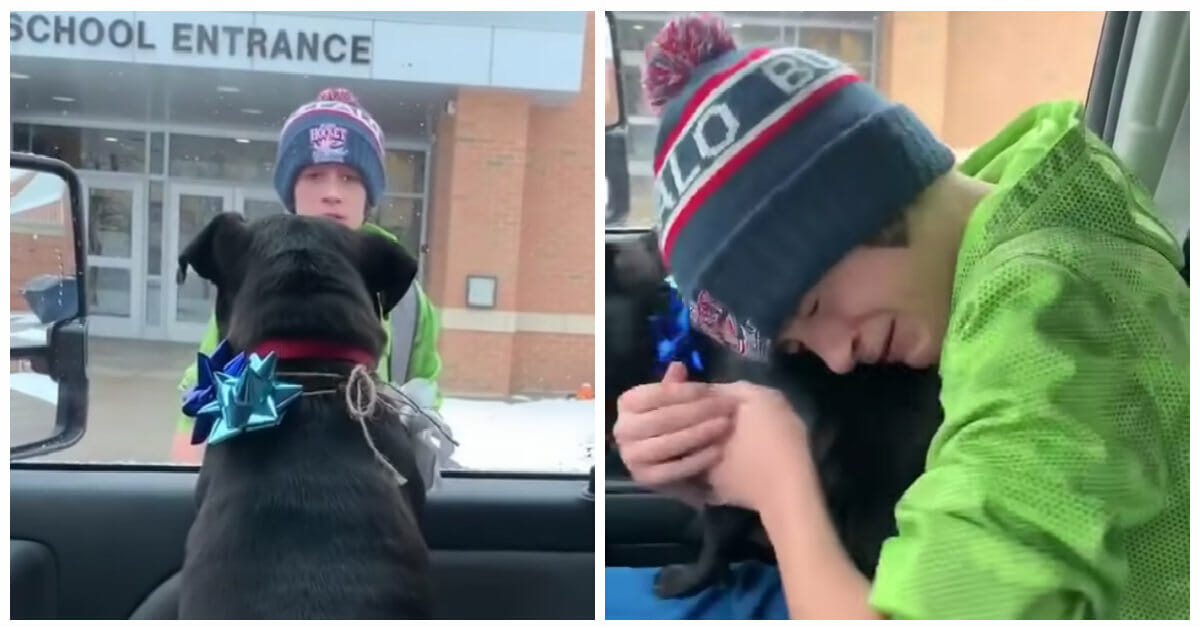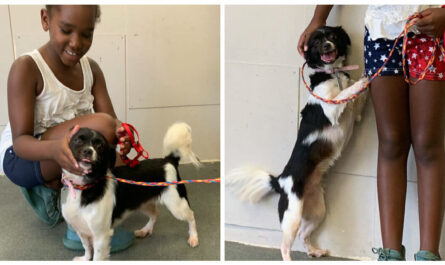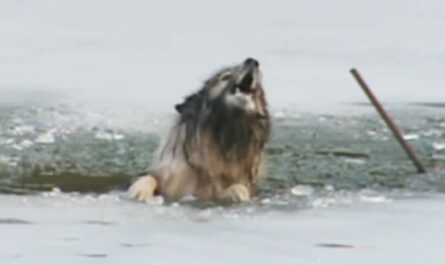There is no better pair of friends than a boy and his dog. Your first pet is your best friend and loyal companion… so it’s truly heartbreaking when they go missing.
It’s a painful experience to think your pal is suddenly gone for good. But one family got a miracle, leading to an unforgettable surprise reunion.
April Elizabeth Licata got her son Carter a very special gift for his 12th birthday: a pug named Piper. Carter had always wanted a dog since the family had another pug when he was a baby, so getting Piper was a longtime dream come true.
The two became inseparable friends… until one day, Piper went missing.
On November 18, April let the dogs out of the house to use the bathroom. But when she let them back in, only one was there—Piper was nowhere to be found.
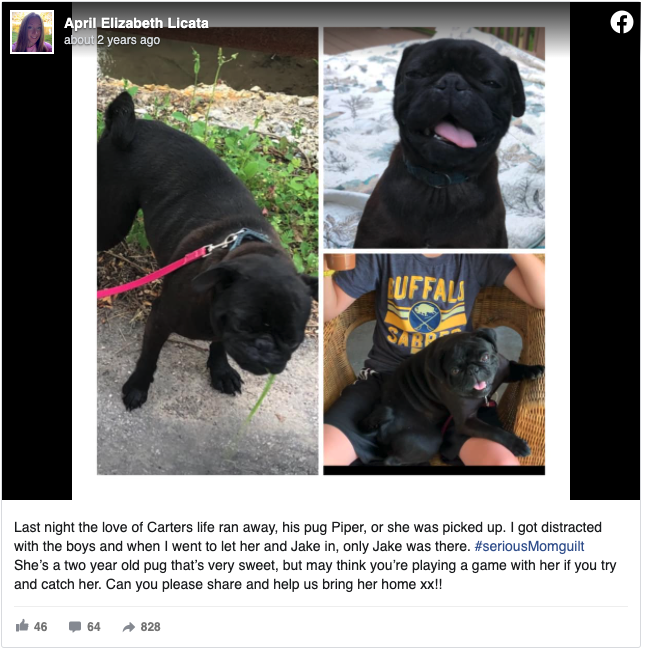

The family looked everywhere for the 2-year-old pug, but over two weeks passed and Piper was nowhere to be found.
“We posted and shared and talked to neighbors, news venues, and community groups but as the days passed, our hope waned,” April wrote on Facebook.
The mom felt terrible over the whole situation… mostly for her son, who she knew lost his best friend: “The love of Carter’s life ran away,” she wrote.
But then, a miracle happened.
April got a message that a dog matching Piper’s description was brought to Genesee County Animal Shelter.
“I was truly shocked,” April wrote. “We had all resigned ourselves to the reality that she prolly wouldn’t come back. Lo and behold, it was her!”
Carter and his sister Natalie were out of town when all this happened, so April decided to make the news extra special by surprising them.
Dressing Piper up in bows, April took the dog to school to pick up Carter. Seeing her old friend through the car window, Piper perked up in excitement:
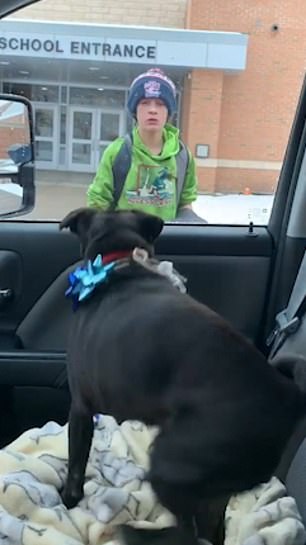

And Carter was shocked to see his dog back again, and broke down in tears as they reunited in the car.
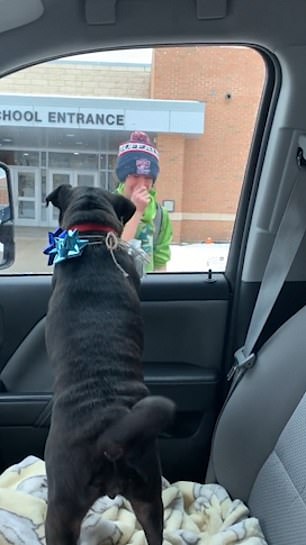

He held his beloved dog in his arms, and probably won’t let go anytime soon.
Watch the video below:
The heartwarming video has been viewed nearly 500,000 times on Facebook.
“It’s so amazing to see the love, and honestly the video says more than any words I could write,” April wrote. “My son loves his dog so much, was sick while she was gone, and [tonight] she’s sleeping next to him again.”
“What a Christmas miracle for our family and thank you to everyone who helped bring Piper home.”
It’s a reminder to not lose hope when a pet goes missing. Miracles can happen, and we’re so glad this boy got to reunite with his dog.
Share this heartwarming story!
Losing a dog can be a distressing and worrisome experience for any pet owner. Whether your dog has escaped from your yard or gone missing during a walk, it’s important to take immediate action to increase the chances of finding your furry friend. Fortunately, there are several steps you can take to help locate a lost dog and bring them back home safely.
The first step in finding a lost dog is to search the immediate area. This includes checking nearby streets, parks, and any other places your dog may have visited before. Call out your dog’s name and listen for any barking or other noises that may indicate their location. It’s also a good idea to ask neighbors, friends, and family members to keep an eye out for your dog and let you know if they spot them.
If you can’t find your dog after searching the immediate area, it’s time to broaden your search. Create flyers with a clear photo of your dog, their name, and your contact information. Post these flyers in your neighborhood, local parks, and other public areas. You can also reach out to animal shelters, veterinary clinics, and pet rescue organizations in your area to see if they have any information about your missing dog. By taking these steps and remaining persistent, you can increase the chances of finding your lost dog and bringing them back home.

 Understanding Your Dog’s Behavior
Understanding Your Dog’s Behavior
Dogs are social animals that form strong bonds with their owners. When a dog gets lost, it can be a traumatic experience for both the dog and the owner. Understanding your dog’s behavior can help you locate them quickly and safely.
Recognizing Signs of Distress
When a dog is lost, they may experience a range of emotions, including fear, confusion, and anxiety. These emotions can cause a dog to behave in unusual ways, such as running away, hiding, or becoming aggressive. Some common signs of distress in dogs include:
- Excessive barking or whining
- Panting or drooling
- Pacing or restlessness
- Trembling or shaking
- Avoiding eye contact
- Loss of appetite
If you notice any of these signs in your dog, it’s important to act quickly to locate them.
Identifying Usual Hiding Spots
Dogs often have favorite hiding spots where they feel safe and secure. These hiding spots can vary depending on the dog’s personality and the environment they are in. Some common hiding spots for dogs include:
- Under beds or furniture
- In closets or cabinets
- Behind curtains or drapes
- In the garage or shed
- Under decks or porches
- In bushes or shrubs
If your dog is lost, it’s important to search these hiding spots first. You can also use treats or toys to lure your dog out of hiding.
In conclusion, understanding your dog’s behavior can help you locate them quickly and safely. By recognizing signs of distress and identifying usual hiding spots, you can increase your chances of finding your lost dog.
Immediate Steps to Take
Losing a dog can be a stressful and emotional experience, but taking immediate action can greatly increase the chances of finding them quickly. Here are some steps to take as soon as you realize your dog is missing.
Contacting Local Authorities
The first thing to do when your dog goes missing is to contact local animal shelters, animal control agencies, and veterinary clinics. File a lost pet report with every shelter within at least a 60-mile radius. Provide them with a detailed description of your dog, including their breed, sex, age, color, and any distinctive markings. It is also important to provide them with your contact information so they can reach you if your dog is found.
Informing Neighbors
Informing your neighbors is also crucial in finding your lost dog. Knock on doors and ask if they have seen your dog or if they have any information that could help. Provide them with a recent photo of your dog and your contact information. Ask them to keep an eye out for your dog and to contact you immediately if they see them.
In addition to talking to your neighbors in person, it is also a good idea to post flyers around the neighborhood. Include a recent photo of your dog, their name, and your contact information. Make sure the flyer is easy to read and eye-catching. Post the flyers in high-traffic areas such as grocery stores, pet stores, and community bulletin boards.
Taking these immediate steps can greatly increase the chances of finding your lost dog quickly. Remember to stay calm and keep searching until your dog is found.
Creating Effective Lost Dog Posters
When a dog goes missing, creating a lost dog poster can be an effective way to spread the word and increase the chances of finding the dog. Here are some tips for creating effective lost dog posters:
Choosing the Right Information
When creating a lost dog poster, it is important to include the right information. The poster should include a clear, recent photo of the dog, as well as the dog’s name, breed, age, gender, and any distinguishing features or markings. It is also important to include the date and location where the dog was last seen, as well as contact information for the owner.
Selecting the Best Photo
The photo is one of the most important elements of a lost dog poster. It is important to select a clear, recent photo of the dog that shows the dog’s face and any distinguishing features or markings. The photo should be high-quality and in focus, with good lighting. If possible, it is also a good idea to include a full-body photo of the dog.
When creating a lost dog poster, it is important to make sure the poster is eye-catching and easy to read. The poster should be printed on bright, colored paper and should include large, bold text. It is also a good idea to include a reward for anyone who finds the dog, as this can motivate people to help in the search.
Overall, creating an effective lost dog poster can be a crucial step in finding a missing dog. By including the right information and selecting the best photo, owners can increase the chances of their dog being found and returned home safely.
Leveraging Social Media
When a dog goes missing, social media can be a powerful tool to help find them. Here are two ways to leverage social media to increase the chances of finding a lost dog.
Utilizing Local Lost and Found Groups
There are many local lost and found pet groups on social media platforms like Facebook. These groups are often organized by region or city and can be a valuable resource for finding lost dogs. Pet owners can post a picture and description of their lost dog, along with contact information, in the group. Other members of the group can then share the post and keep an eye out for the missing dog.
It’s important to join these groups before a dog goes missing, so pet owners can quickly post if their dog does go missing. Some popular lost and found pet groups include the Arkansas Lost and Found Pet Network and Lost Dogs of America.
Using Paid Advertisements
Social media platforms like Facebook and Instagram also offer paid advertising options that can be used to help find a lost dog. Pet owners can create an advertisement with a picture and description of their lost dog, along with contact information. The advertisement can then be targeted to specific geographic areas, making it more likely that people in the area will see the advertisement and recognize the lost dog.
Paid advertising can be a more expensive option, but it can be effective in reaching a large audience quickly. Pet owners can also set a budget for their advertisement to control costs.
Overall, social media can be a powerful tool for finding lost dogs. By utilizing local lost and found groups and paid advertising, pet owners can increase the chances of their lost dog being found.
Searching the Neighborhood
When looking for a lost dog, the first step is to search the surrounding area. Here are some tips on how to effectively search your neighborhood:
Organizing a Search Party
Organizing a search party can be a great way to cover more ground and increase the chances of finding your lost dog. Here are some tips on how to organize a search party:
- Recruit friends, family, and neighbors to join the search.
- Assign search areas to each person in the group.
- Set up a meeting point to regroup and share information.
- Provide a flyer with a photo and description of your dog to each person in the search party.
- Make sure to search all areas thoroughly, including backyards, parks, and other nearby spots.
Using Your Dog’s Favorite Toy
If your dog has a favorite toy, using it during the search can be helpful. Here are some tips on how to use your dog’s favorite toy:
- Bring the toy with you during the search.
- Use the toy to make noise and get your dog’s attention.
- Leave the toy in an area where your dog may have passed by, such as a park or trail.
- If your dog is found, use the toy to help lure them back to you.
Remember to stay calm and keep a positive attitude during the search. With these tips, you can increase the chances of finding your lost dog.
Contacting Animal Shelters and Vet Clinics
One of the most important steps in finding a lost dog is to contact animal shelters and vet clinics in your area. These organizations often have resources and networks that can help you locate your pet.
When contacting animal shelters and vet clinics, be prepared to provide a detailed description of your dog, including its breed, age, sex, and any identifying features. You should also provide a recent color photograph of your dog, if possible.
It’s important to contact all of the shelters and animal control departments in your area, as well as those within a 60 mile radius, as recommended by the Humane Society of the United States. You can use online resources to find contact information for these organizations.
When speaking with staff at animal shelters and vet clinics, be sure to ask if they have seen or heard anything about your dog. You should also ask if you can post flyers or posters in their facility or on their website.
In addition to contacting animal shelters and vet clinics, it’s a good idea to check with local rescue organizations and post on social media platforms. The more people who are aware of your lost dog, the better your chances of finding it.
Hiring a Professional Pet Detective
If all other methods fail to find a lost dog, hiring a professional pet detective can be the next step. Pet detectives are experts in finding lost pets and use special techniques, equipment, and expertise to track down and reunite pets with their owners.
To find a professional pet detective, one can search online or ask at the local shelter. However, it is important to do research and choose a reputable and experienced pet detective. One can also ask for recommendations from friends or family who may have used a pet detective in the past.
When hiring a pet detective, it is important to ask about their experience, success rate, and the techniques they use to find lost pets. It is also important to discuss the cost and any additional fees that may be involved in the search process.
Pet detectives may use a variety of techniques to find lost dogs, including tracking dogs, surveillance cameras, and social media. They may also work with local shelters, veterinarians, and animal control to increase the chances of finding a lost dog.
Overall, hiring a professional pet detective can be a helpful option for finding a lost dog. However, it is important to do research and choose a reputable and experienced pet detective to increase the chances of a successful reunion.
Preventing Future Losses
Losing a dog is a traumatic experience for both the owner and the pet. To prevent future losses, there are a few things that owners can do to ensure their dog’s safety.
Microchipping Your Dog
Microchipping is a simple and effective way to ensure that your dog can be identified and returned to you if he or she becomes lost. A microchip is a tiny device, about the size of a grain of rice, that is inserted under the skin of your dog. It contains a unique identification number that can be read by a scanner at a veterinary clinic or animal shelter.
When you get your dog microchipped, make sure to keep your contact information up-to-date with the microchip company. This will ensure that if your dog is found, you can be contacted quickly and easily.
Training Your Dog to Stay Close
One of the best ways to prevent your dog from becoming lost is to train him or her to stay close to you. This can be done through positive reinforcement training, where you reward your dog for staying close to you and following commands.
When you’re out with your dog, make sure to keep him or her on a leash in areas where it’s required. If you’re in an off-leash area, make sure your dog is well-trained and responsive to your commands before letting him or her off the leash.
Additionally, make sure your dog is comfortable and happy in your home. If your dog is anxious or stressed, he or she may try to escape or run away. Providing your dog with plenty of exercise, mental stimulation, and affection can help prevent this.
By microchipping your dog and training him or her to stay close, you can greatly reduce the risk of losing your pet. With a little effort and preparation, you can keep your furry friend safe and by your side.
